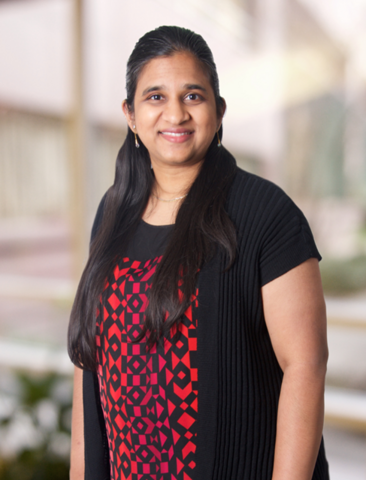 What is your hometown?
What is your hometown?

Madurai, Tamil Nadu, India.
How/when did you become interested in science and/or medicine?
I became interested in medicine when I was 10 years old. My dad, a microbiologist, sparked my love of science by teaching me about microorganisms that could cause disease but also be useful to us in medicine and in agriculture. This fascinated me and I wanted to know more about them. Growing up in India I had family members that contracted infections such as TB, meningitis, and Hepatitis A that were severe and sometimes fatal and I wanted to become a doctor when I grew up so that I can treat people afflicted by these illnesses.
When did you join the University of Iowa faculty?
January 2017
How or why did you choose to join the faculty at the University of Iowa?
I have always wanted to work in academic medicine since in addition to caring for patients, I would also be able to do research, teach and participate in other scholarly activities. The University of Iowa is highly ranked in many specialties and the physicians here provide excellent care for their patients. The unique thing about Iowa is that all faculty, including the world’s foremost experts in their field, are down to earth and easily approachable. So, when a position opened at the University of Iowa for an infectious disease physician, I was excited to apply.
Is there a teacher or mentor who helped shape your career?
Dr. T.P. Ganesan, the first MD in Trichy (a big city in India) was my mentor and biggest inspiration. He cared for my grandparents, my parents and me. He had a small clinic where he used history and physical examination alone (with minimal lab/imaging studies) to diagnose and treat patients. He kept up with the current literature and practiced medicine until he died at the age of 93. His patients were not obliged to pay him (India has a fee for service model) anything and left whatever money/goods that they could. I was inspired by his passion for medicine, and his caring for the poor and the sick.
How do you see your faculty role impacting medicine and/or science?
I think my biggest impact in medicine would be passing on what I have learned to future generations of healthcare providers. I teach my students to provide compassionate care to patients and to always listen to everyone on the healthcare team including the patients and their families since you never know who might provide a brilliant idea that leads to making the correct diagnosis.
What is the biggest change you've experienced in your field since you were a student?
Hepatitis C is now curable with a short course of oral medications.
What one piece of advice would you give to today's students?
Always listen to your patients and treat them as you would treat your family members and how you would want to be treated.
In what ways are you engaged in professional activities outside the University (i.e. population-based research, mentoring high school students, sharing your leadership/ expertise with organizations or causes, speaking engagement off campus, etc.)?
I do research with faculty at the VA on when it is appropriate to prescribe antibiotics chronically to suppress infections that cannot be cured. I also do research with an anthropologist at UIHC to learn about how physicians make decisions on treatment of infections. I co-chaired the culturally responsive healthcare in Iowa conference in 2019 which focuses on providing culturally competent and responsive care, improving access to care and reducing health disparities.
What are some of your outside (personal) interests?
Photography, traveling internationally, road trips in the US visiting national parks and small towns, making and trying various cuisines, gardening
Learn more about Poorani Sekar, MD.